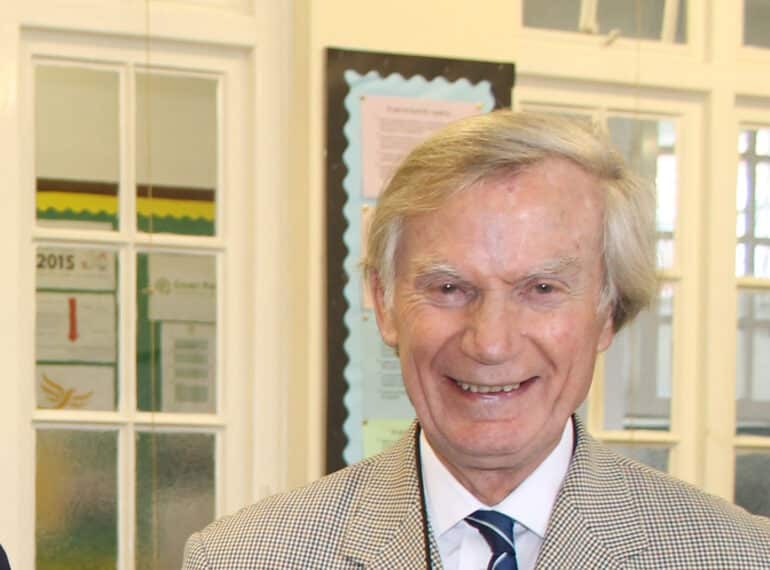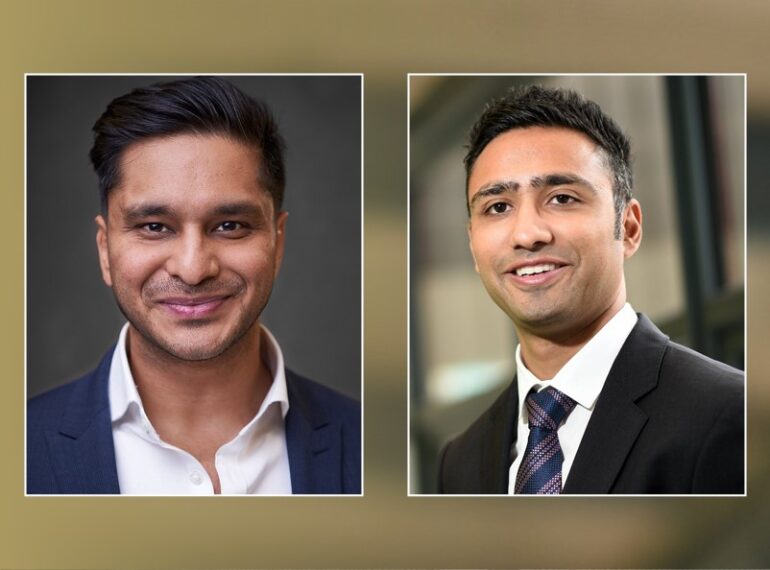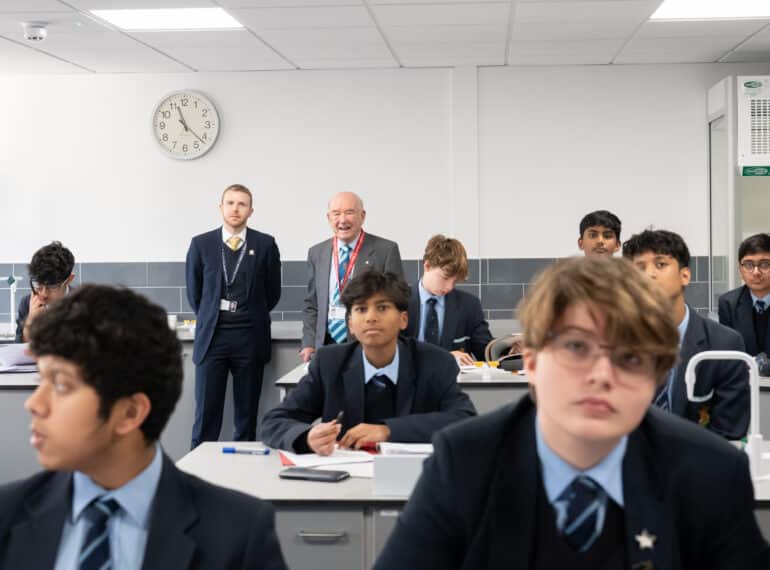
OE benefactor Tony Sherrard (1952-1959) enjoyed the chance to see the fruits of his generosity only a few months after making his substantial donation to the School. His gift was put towards work to completely refurbish two Chemistry laboratories in the Fern Building.
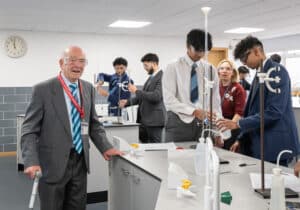 The project went ahead this summer after The Wolfson Foundation (an educational charity) provided its maximum £100,000 grant in January in response to FQE committing significant funds towards the £230K overall cost.
The project went ahead this summer after The Wolfson Foundation (an educational charity) provided its maximum £100,000 grant in January in response to FQE committing significant funds towards the £230K overall cost.
For his part, Tony decided to make his own substantial donation after reading the Headmaster’s article about the project in the Old Elizabethans Association magazine. Tony retired in 1997 after an illustrious career in the chemical and pharmaceuticals industries, so an investment in chemistry facilities was close to his heart.
Accordingly, he brought forward the donation he had planned to make in his will so that the current generation of boys could immediately benefit.
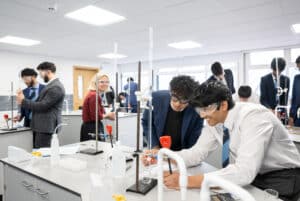 During his visit to the School this term, he called in on lessons in the labs, including a Year 13 practical, speaking to the boys and to Head of Chemistry Amy Irvine. Afterwards, Tony said how pleased he was to see so many taking A-level sciences, and Chemistry in particular.
During his visit to the School this term, he called in on lessons in the labs, including a Year 13 practical, speaking to the boys and to Head of Chemistry Amy Irvine. Afterwards, Tony said how pleased he was to see so many taking A-level sciences, and Chemistry in particular.
Tony keeps in touch with a number of fellow OEs and attends the Forty Society lunches. He now lives in Buckinghamshire.
In his own words: Tony Sherrard
I was born in September 1941 and attended Merryhills Primary school, located between Oakwood and Enfield.
Starting in Eric Shearly’s Form 1C, one of the first group of pupils that benefitted from the three-form entry, I was among the youngest (not yet 11 years of age on entry) and one of the few ‘out-of-county’ pupils, too. Despite winning the form prize in the second year (Form 2C), achieving upper quartile marks in later years, my A-level marks were disappointingly ordinary. Being only 16, I stayed on in the seventh form, but the exam results in 1959 showed little improvement, although the benefit of this extra year was evident at university.
I enjoyed sporting and outdoor activities, and although slightly built and short, I played for the Third XV and Third XI on the rugby field and cricket pitches respectively. I continued to play rugby for: the OEs (occasionally in the university holidays); Mumbles RFC, a feeder Club for Swansea; and Furness RFC in Barrow-in-Furness.
During my QE years, I was involved with the gym club’s presentation at the hobbies exhibition, played chess, collected stamps and developed an interest in photography. School and Scouting supported my interest in photography and rambling/fell-walking respectively, both of which remain an interest to this day.
Following external careers advice, I chose to study Chemical Engineering at the University College of Swansea, that benefitted from project work in the local heavy industries, securing a B.Sc degree and an opportunity to pursue a doctorate on techniques used in the oil and pharmaceutical industries. So, in 1965 I completed my PhD and took a job with Glaxo Laboratories at its factory on the southern coast of the Lake District. This factory was a Primary Production unit, manufacturing bulk active ingredients for prescription medicines, including antibiotics and fine chemicals. It provided excellent experience, which involved optimising and troubleshooting the various processes and equipment, designing new chemical processes, and developing solvent recovery systems. In the first ten years at Glaxo, I also managed an antibiotic extraction plant in County Durham and was part of a commissioning team at a new factory near Newcastle.
In preparation for a senior role in a new factory in SW Scotland, I spent time gaining more experience of operating fine chemicals plant in eastern Scotland. So, I became Factory Manager of the small new factory during the completion of construction, the commissioning and the initial production phases in 1977-81. From there, I was appointed Production & Technical Director in Glaxo Australia, responsible for three factories in Tasmania and Victoria – two small ones manufacturing opiates and the other in Melbourne producing prescription medicines predominantly for the Australian market. My contract ran out after three-and-a-half years and I returned to the large UK factory in South Cumbria. Here, initially, I had responsibility for the chemical processes, with the output dominated by antibiotics; later I was promoted to Factory Manager, responsible for the 24/7 day-to-day operations and for developing long-term plans for the factory within the framework of the Glaxo Group’s available Primary Production facilities. After five years (1989-94) in this demanding role, and having spent approximately 20 years working on the edge of Lake District, I moved to a head office role. Here, I became involved in developing the manufacturing strategy for bulk actives ingredients following the merger of Glaxo and Wellcome. With inevitable duplication of skills in the merger, I decided to take redundancy/early retirement at the end of 1997, after more than 32 years in manufacturing for Glaxo, and, latterly, Glaxo-Wellcome.
Shirley and I married more than 50 years ago, and she was a great support as we moved with my career. We have one daughter who also pursued a career in chemical engineering (working for BP for eighteen years and now teaching Physics to A-level,) and one granddaughter. Golf, travel, and charity work within the Rotary umbrella have been key activities in retirement, although health issues have restricted these in the last few years.
Dr Anthony John Sherrard C Eng, MIChemE

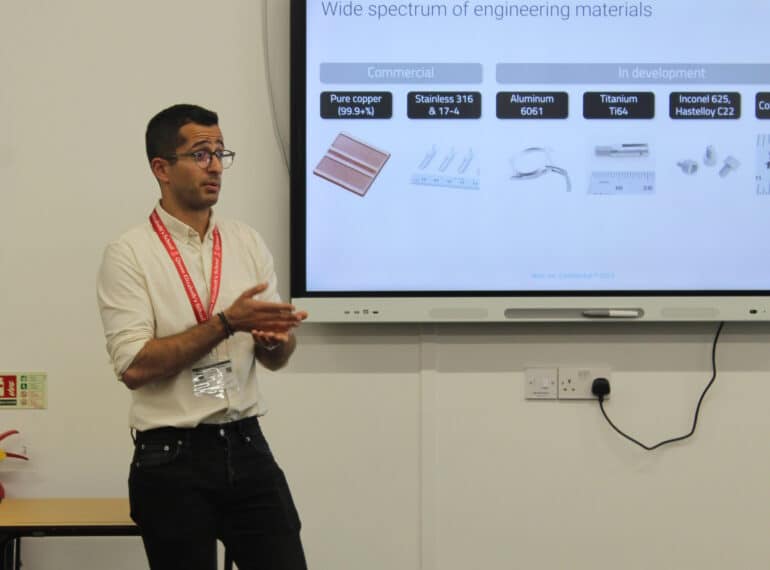
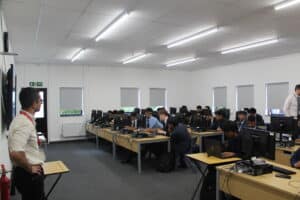 After working for global software firm Autodesk, based in San Francisco, Arian (OE 1998–2003) raised venture capital and successfully spun out its additive manufacturing team to form Holo, while also transitioning its technology from the 3D printing of polymers to metals. Six-and-a-half years later, Holo is at the forefront of innovation, using its proprietary digital platform to enable the manufacturing at scale of high-performance parts across a range of materials, including metals, ceramics and composites. Holo is supported by top-tier Silicon Valley investors and strategic partners.
After working for global software firm Autodesk, based in San Francisco, Arian (OE 1998–2003) raised venture capital and successfully spun out its additive manufacturing team to form Holo, while also transitioning its technology from the 3D printing of polymers to metals. Six-and-a-half years later, Holo is at the forefront of innovation, using its proprietary digital platform to enable the manufacturing at scale of high-performance parts across a range of materials, including metals, ceramics and composites. Holo is supported by top-tier Silicon Valley investors and strategic partners.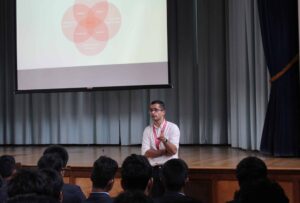 Head of Technology Michael Noonan said: “Arian provided Year 12 with a workshop which firstly covered his professional journey to date, from his early days post PhD working on founding his own company (The Invention Works) through to his position as Senior Principal Engineer at Autodesk. Most of the workshop, however, focussed on his current company, Holo. He explained that he and the other co-founders could see the enormous potential to create a viable business in this area and so pursued it as an opportunity.”
Head of Technology Michael Noonan said: “Arian provided Year 12 with a workshop which firstly covered his professional journey to date, from his early days post PhD working on founding his own company (The Invention Works) through to his position as Senior Principal Engineer at Autodesk. Most of the workshop, however, focussed on his current company, Holo. He explained that he and the other co-founders could see the enormous potential to create a viable business in this area and so pursued it as an opportunity.”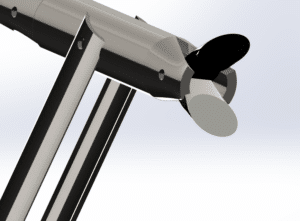 The instrument should have six degrees of freedom
The instrument should have six degrees of freedom In the lunchtime talk to Year 10, Arian took a more personal look at his story, beginning with his time at QE, when he was in Stapylton House and was a musician and prefect.
In the lunchtime talk to Year 10, Arian took a more personal look at his story, beginning with his time at QE, when he was in Stapylton House and was a musician and prefect.
 His QE contemporaries, Sam Bayney and Harikesan Baskaran, were also among those helping out on the day.
His QE contemporaries, Sam Bayney and Harikesan Baskaran, were also among those helping out on the day. Galactic Challenge, which is for students aged 10-14, is the sister competition of the UK Space Design Competition (UKSDC), which is for those aged 15–18. Aadil has for several years supported both competitions and is a member of the UKSDC board. A Senior Analyst with the Cabinet Office, he graduated with a first in Physics from Imperial College London.
Galactic Challenge, which is for students aged 10-14, is the sister competition of the UK Space Design Competition (UKSDC), which is for those aged 15–18. Aadil has for several years supported both competitions and is a member of the UKSDC board. A Senior Analyst with the Cabinet Office, he graduated with a first in Physics from Imperial College London. In addition to Aadil, the competition was judged by staff from the Space Science & Engineering Foundation, as well as QE Head of Physics Jonathan Brooke, and Dr Flore Faille, Head of Physics at HBS.
In addition to Aadil, the competition was judged by staff from the Space Science & Engineering Foundation, as well as QE Head of Physics Jonathan Brooke, and Dr Flore Faille, Head of Physics at HBS.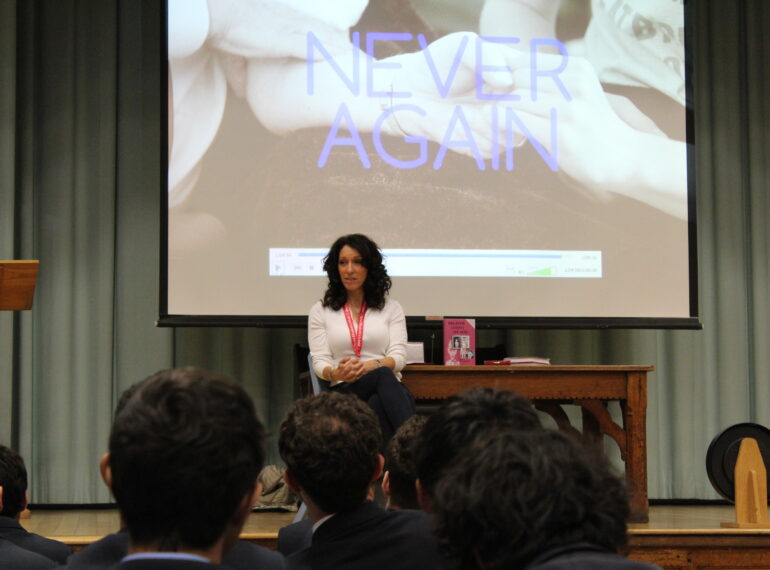
 The film, Breathe Deeply My Son, was shown to Year 9, with a question-and-answer session afterwards.
The film, Breathe Deeply My Son, was shown to Year 9, with a question-and-answer session afterwards.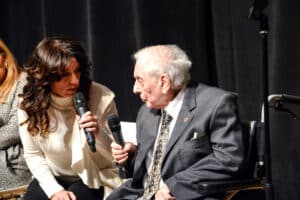 Mr Wermuth survived the war weighing just 5st 3lb (33kg). His father, mother and sister all died in concentration camps.
Mr Wermuth survived the war weighing just 5st 3lb (33kg). His father, mother and sister all died in concentration camps.